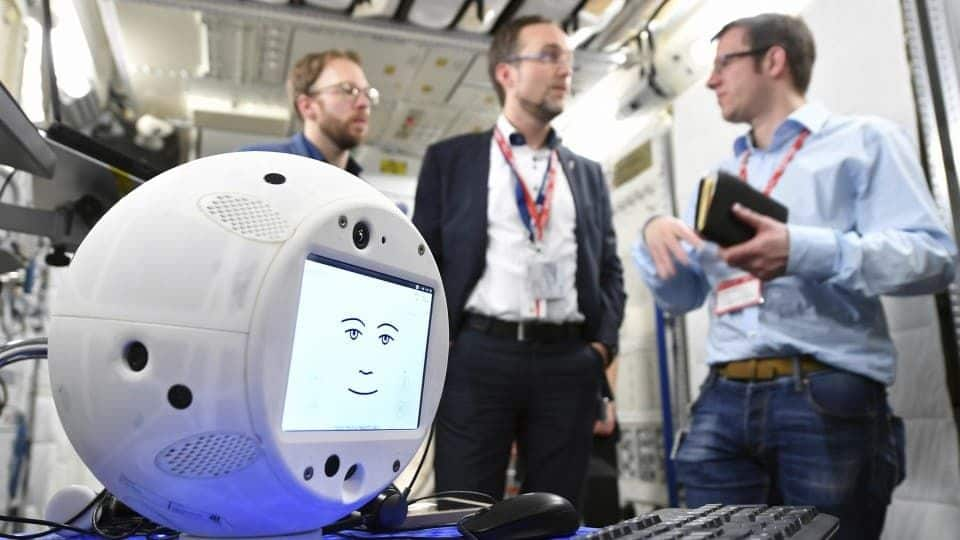WorldPost: Artificial intelligence is surely the most consequential technological development of the 21st century. In your book “AI Superpowers,” you’ve written the most comprehensive global account of artificial intelligence to date. What are the central themes of your book?
copyright by www.washingtonpost.com
 Kai-Fu Lee is the chairman of Sinovation Ventures and the president of its Artificial Intelligence Institute. He was the founding president of Google China. He recently spoke about his new book, “AI Superpowers: China, Silicon Valley and the New World Order,” with The WorldPost’s editor in chief, Nathan Gardels.
Kai-Fu Lee is the chairman of Sinovation Ventures and the president of its Artificial Intelligence Institute. He was the founding president of Google China. He recently spoke about his new book, “AI Superpowers: China, Silicon Valley and the New World Order,” with The WorldPost’s editor in chief, Nathan Gardels.
Kai Fu Lee: The benefits, as well as the potential disruptive effects of AI, are well known. To give only a few obvious examples, AI has already enabled us to amplify our knowledge through search engines, connect people who speak different languages through machine translation and save us billions of dollars from credit card theft and fraud.
In the future, AI holds the promise of significantly improving medical diagnosis and lowering the cost of health care. AI can personalize education and improve the speed of learning. It will enable automated stores and factories, thus significantly reducing the cost of goods and services. Finally, intelligent machines will take care of our chores, such as driving, cooking, cleaning, dishwashing and laundry, giving us back our most valuable resource — our time. PricewaterhouseCoopers estimates AI will add $15.7 trillion to the world economy by 2030.
Taking care of our chores and automating manufacturing, of course, will mean a total disruption of patterns of work and employment. Some estimate as many as 40 percent of current jobs will be lost to intelligent machines.
Most reports and books on the subject have been written either from a technologist/researcher perspective or from a business, history or economics perspective. I come at it through all of these lenses and as someone who has extensive experience in both China and the United States — the great AI duopoly. My aim is to acknowledge and understand the critical lessons of China’s rise as a tech power, not based on misconceptions in the West about intellectual property theft or government protection. Of course, Chinese entrepreneurs had their scrappy, questionable methods in the early days. But its tech industries have evolved into a completely legitimate method of starting world class Internet and AI businesses.
The AI revolution will have two engines — China and the United States — pushing its progress swiftly forward. It is unlike any previous technological revolution that emerged from a singular cultural setting. Having two engines will further accelerate the pace of technology.[…]
read more – copyright by www.washingtonpost.com
Thank you for reading this post, don't forget to subscribe to our AI NAVIGATOR!


WorldPost: Artificial intelligence is surely the most consequential technological development of the 21st century. In your book “AI Superpowers,” you’ve written the most comprehensive global account of artificial intelligence to date. What are the central themes of your book?
copyright by www.washingtonpost.com
Kai Fu Lee: The benefits, as well as the potential disruptive effects of AI, are well known. To give only a few obvious examples, AI has already enabled us to amplify our knowledge through search engines, connect people who speak different languages through machine translation and save us billions of dollars from credit card theft and fraud.
In the future, AI holds the promise of significantly improving medical diagnosis and lowering the cost of health care. AI can personalize education and improve the speed of learning. It will enable automated stores and factories, thus significantly reducing the cost of goods and services. Finally, intelligent machines will take care of our chores, such as driving, cooking, cleaning, dishwashing and laundry, giving us back our most valuable resource — our time. PricewaterhouseCoopers estimates AI will add $15.7 trillion to the world economy by 2030.
Taking care of our chores and automating manufacturing, of course, will mean a total disruption of patterns of work and employment. Some estimate as many as 40 percent of current jobs will be lost to intelligent machines.
Most reports and books on the subject have been written either from a technologist/researcher perspective or from a business, history or economics perspective. I come at it through all of these lenses and as someone who has extensive experience in both China and the United States — the great AI duopoly. My aim is to acknowledge and understand the critical lessons of China’s rise as a tech power, not based on misconceptions in the West about intellectual property theft or government protection. Of course, Chinese entrepreneurs had their scrappy, questionable methods in the early days. But its tech industries have evolved into a completely legitimate method of starting world class Internet and AI businesses.
The AI revolution will have two engines — China and the United States — pushing its progress swiftly forward. It is unlike any previous technological revolution that emerged from a singular cultural setting. Having two engines will further accelerate the pace of technology.[…]
read more – copyright by www.washingtonpost.com
Thank you for reading this post, don't forget to subscribe to our AI NAVIGATOR!
Share this: